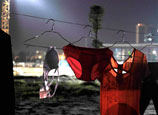
BEIJING, May 21 (Xinhua) -- A top Chinese wildlife official on Tuesday detailed how recent years have seen China intensify efforts to protect animals and promote biodiversity.
Speaking at a press conference on the eve of the International Day for Biological Diversity, Yin Hong, deputy director of the State Forestry Administration (SFA), said that the country, among the richest in wildlife species in the world, has attached great importance to wildlife protection.
There are more than 6,500 vertebrate species in China, representing about 10 percent of the world's total, data from the SFA showed.
Over 470 land-living vertebrates are native only to China, including the giant panda, golden monkey, South China tiger and Chinese alligator.
To better protect the country's biodiversity, China has constantly worked to improve its legal framework in the past few decades, Yin said.
The country's put the Law on the Protection of Wildlife into effect in 1988, laying down the basic principles for the conservation of precious and endangered species, as well as the protection, development and rational use of wildlife to safeguard the ecological balance.
The country has now built a fully fledged legal framework with a series of laws and regulations made by both the central government and local-level governments.
Building nature reserves has played an important role in China's wildlife protection efforts.
SFA data showed there are currently more than 2,150 natural reserve areas covering 13 percent of the country's territory, giving effective protection to more than 85 percent of wildlife under national-level protection.
China included a total of 256 species in a catalog of national-level protected species released in 1988. It is illegal to slaughter or sell those species.
The country has also constructed natural protection districts, wetlands and forest parks to serve as the major battlefields to protect wild animals, according to Yin.
The SFA has set up more than 1,000 stations for wildlife disease monitoring around the country, which played a significant role during China's recent efforts to guard against the H7N9 bird flu.
China has also moved to expand the population of endangered species, cracked down on illegal slaughtering and sales of wildlife and intensified international collaboration in conserving endangered species and promoting biodiversity.
After decades of consistent effort, China's endangered species have reversed the trend of continuous decline and started rising steadily during the past 10 years, Yin said.
"Some extremely endangered species are stepping away from the danger of extinction," she said.
Her view is proved by changes in the number of giant pandas, an endangered species native only to China.
More than 2,000 giant pandas were living in the wild in the 1970s. The number dropped to 1,114 in the 1980s, according to two separate surveys.
A third survey conducted from 1999 to 2003 showed that the number had risen to 1,596.
An update on the number of giant pandas is not available as the country is currently conducting the fourth survey, which may last to 2014, according to Yan Xun, chief engineer of the wildlife conservation department under the SFA.
The number of crested ibises, a rare bird species, has risen from only seven in 1981 to more than 1,700 at present thanks to the country's protection and artificial breeding efforts.
The administration is going to vigorously push forward wildlife protection to contribute to safeguarding the biodiversity of China and the whole world, Yin said.
Regarding doubts over the link between China's legal ivory trade and the rising elephant poaching in Africa, Yan Xun, chief engineer of the wildlife conservation department under the SFA, said there is "no necessary connection" between the two.
He said the reasons of rampant poaching are very complex, ranging from resources competition between people and elephants in some countries, wars to illegal trade.
"China has so far gained over 60 tonnes of ivory through international auctions," Yan said, adding the annual combined consumption of China's 37 legal processing companies was no more than 5,000 kilograms.
"China is very tough on ivory smuggling and illegal trade," he said.
The International Day for Biological Diversity, sanctioned by the United Nations, is marked around the world on May 22 each year.
















 China’s weekly story
China’s weekly story
(2013.5.11-5.17)


![]()
